Diversity at the Grammy’s
February 2, 2018
Sunday, January 28 the 60th Annual Grammys aired, and whether it was the backlash of the #GrammysSoWhite movement on Twitter or if the Grammys genuinely started to recognize people of color, they finally stepped up their game this year and represented more POCs than ever.
In 2014, Drake’s Started from the Bottom lost the Grammy award for Best Rap Song to Macklemore’s Thrift Shop.
In a way, the face of black culture and rap culture was being represented by a “goofy song,” says Kalkidan Agonafer.
Not only did this happen in the music industry, but also the film industry.
“They put Get Out as a comedy at the Golden Globes. I just do not understand how that has any comedic references in it,” explains Kristen Johnson.
Get Out was one of the first movies to really elaborate on deep-seated fears within an interracial relationship and even reflects some of black history.
“[This is] how our society is nowadays and how we still view that white people are more superior,” comments Joe Nicolosi.
Referring to the Taylor Swift / Kanye West / Beyonce controversy at the 2009 VMAs, Nicolosi continues, “…Beyonce has been nominated for a lot of [awards], but always seems to lose, even though she is probably one of the biggest inspirations to [people of color].”
As more conflicts like this became an annual tradition at the Grammys, many people became angered with the nominations and took to Twitter with the #GrammysSoWhite movement.
“The Grammys were being selective when choosing people of color. We do not really see them much at award shows,” remarked Ginafer Mensah.
Mensah continued, “Diversity in general is very limited. Sometimes I sit in a classroom with predominantly white people, and I feel like I do not belong.”
With the low representation of people of color, the Grammys and white artists were criticized.
Though attacking singers was uncalled for, a few guests, like Ed Sheeran, Taylor Swift, and Justin Timberlake, reportedly declined to appear at the event due to the public’s heavy backlash of not acknowledging their inspirations when making black culturally influenced music.
This year, all five nominees for Record of the Year – Luis Fonsi, Kendrick Lamar, Jay-Z, Bruno Mars, and Childish Gambino – are people of color.
Not only are the Grammys racially diverse this year, they are also gender inclusive.
Lorde was one of the five nominees, along with four men of color, to be nominated for Album of the Year. Though she is white, the most common demographic of a white male was not featured in the nominations.
Although POCs are being more recognized at the Grammys, there’s still a lack of representation in the entertainment industry.
Though there are the BET Awards to appreciate black excellence, not all categories are there.
“The CMAs are big with only representing white people. I know a lot of black country singers, and they do not get recognized,” adds Nicolosi.
But what is it a big deal? Kristen Johnson claims, “White people think they are more dominant. They were the first people to be in music and films.”
Most people of color were never acknowledged until the Civil Rights Act, when black people were starting to fight against segregation.
“There is always gonna be a race problem. For little kids that do not have a lot of money and live in a bad neighborhood, they flip on the TV and see someone with their skin color. They feel like they can accomplish something.” responded Braeden Farbes and Ryan Collins.
Not only do POCs inspire little kids, but they create milestones in history. Over the course of American history POCs have faced terrible oppression; however society is beginning to realize not only the systemic discrimination in America but also the incredible contributions from POC.
Mikail Allen explains, ”People of color are taking over the music industry. We even took over the fashion industry. More African American clothing lines are starting to pop up. We are making a big step. We started at the bottom with oppression and slavery. Now anything they throw at us, we are going overcome.”







